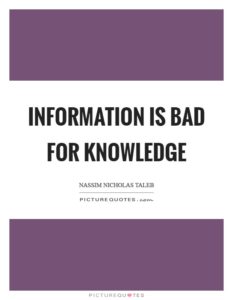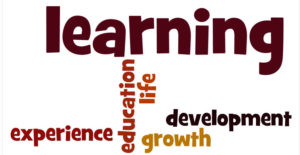 I have often said that knowledge impedes learning. I’m referring to Knower/Judger intellectual knowledge, which until recently, I believed was the only type.
I have often said that knowledge impedes learning. I’m referring to Knower/Judger intellectual knowledge, which until recently, I believed was the only type.
We glean knowledge from many places. As children, our parents are our primary source of customs, rules, language, truths, humor, etc. Until the age of three or four, they may be the only source. As children, we believe this information is correct and that we have everything we need to understand situations and make decisions.
As we start to branch out in our world, other sources begin contributing to our K/J. Relatives (aunts/uncles, siblings), friends, teachers, and spiritual leaders chime in. These people and institutions contribute to our knowledge.
This is academic knowledge—information passed on from a more knowledgeable person to a less knoedgeable person. It starts to fill our intellectual buckets, but it’s not the only way. Empirical knowledge, conversely, forms from our experiences instead of from our intellectual superiors.
Sometimes our empirical knowledge matches our academic knowledge. We all remember our parents saying: “See, I told you that would happen.” This may lead to our natural inclination to put more stock into academic data than empirical. So, even though you may experience something different from what you were taught, your K/J refuses to believe it. You may even justify it as a rare occurrence that doesn’t warrant changing your K/J rule.
If we nurture it, empirical knowledge can influence our K/J just as much, if not more than academic knowledge. When you trust your gut and rely on experiences to influence your K/J, your learning is no longer hampered by your knowledge. You are better equipped to adapt to different circumstances in your life.
We start developing empirical knowledge very early in life. Without language to communicate, we learn how to get what we want (e.g., milk, attention, dry diaper) through our behaviors. When language and conversation enter our lives, other people’s rules overwrite our experiences. It often starts when our parents tell us “No.” Their instructions regulate our actions, not our experiences.
By the time you reach your 30s or 40s, you have a fully functional K/J with rules established by family members and teachers, and life experience. So how do you decide when to use academic information and when to access your imperial knowledge?
We’ve all encountered situations when we see an event unfolding, and our academic K/J knows the inevitable outcome and what our response is supposed to be. If you’re not nurturing your empirical side, you won’t be able to see or respond differently. Some people find it harder than others to use experiences to guide their actions and adapt accordingly.
During the past 15 years coaching hundreds of individuals, I’ve personally seen that we have a natural tendency to trust our academic K/J first. It seems to be a self-preservation technique. That sometimes makes it difficult to trust our experience to understand what’s going on.
In his book Antifragile, Nassim Nicholas Taleb declares that there are both academics and doers in the world. The same concept applies to this article. On the polar extremes, there are those locked in by academic rules and those who explore the world by trying, failing, succeeding, loving, and losing. Most people use a combination of both approaches, but we all have the ability to reach into the empirical realm if and when it’s important enough. (Determining what is important enough is an article itself!)
As I said at the start, I believe the academic K/J knowledge hinders learning. When we can tap into that newborn survival mentality (e.g., how do I get food?), we can reduce stress, frustration, and ultimately get more of what we want. Learn to nurture your empirical knowledge.



